| Listing 1 - 10 of 17 | << page >> |
Sort by
|
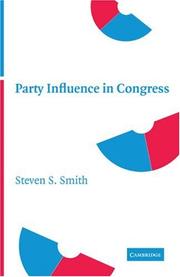
ISBN: 9780521703871 9780521878883 9780511812613 9780511290503 0511290500 0511289901 9780511289903 0511812612 0521878888 0521703875 1107183634 1280917318 9786610917310 051128862X 0511301871 0511289308 9781107183636 9781280917318 6610917310 9780511301872 9780511289309 Year: 2007 Publisher: Cambridge ; New York : Cambridge University Press,
Abstract | Keywords | Export | Availability | Bookmark
 Loading...
Loading...Choose an application
- Reference Manager
- EndNote
- RefWorks (Direct export to RefWorks)
Party Influence in Congress challenges current arguments and evidence about the influence of political parties in the US Congress. Steven S. Smith argues that theory must reflect policy, electoral, and collective party goals. These goals call for flexible party organizations and leadership strategies. They demand that majority party leaders control the flow of legislation; package legislation and time action to build winning majorities and attract public support; work closely with a president of their party; and influence the vote choices for legislators. Smith observes that the circumstantial evidence of party influence is strong, multiple collective goals remain active ingredients after parties are created, party size is an important factor in party strategy, both negative and positive forms of influence are important to congressional parties, and the needle-in-the-haystack search for direct influence continues to prove frustrating.
Etats-Unis. Congress --- United States. Congress --- Verenigde Staten. Congress --- Political parties --- Power (Social sciences) --- Partis politiques --- Pouvoir (Sciences sociales) --- United States. --- United States --- Etats-Unis --- Politics and government --- Politique et gouvernement --- Politics and government. --- Government --- History, Political --- Social Sciences --- Political Science
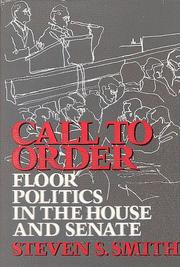
ISBN: 0815780141 Year: 1989 Publisher: Washington, D.C. Brookings Institution
Abstract | Keywords | Export | Availability | Bookmark
 Loading...
Loading...Choose an application
- Reference Manager
- EndNote
- RefWorks (Direct export to RefWorks)
Sociology of policy --- Government --- United States of America
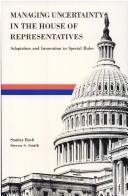
ISBN: 0815707428 Year: 1988 Publisher: Washington, D.C. Brookings Institution
Abstract | Keywords | Export | Availability | Bookmark
 Loading...
Loading...Choose an application
- Reference Manager
- EndNote
- RefWorks (Direct export to RefWorks)
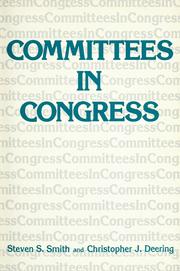
ISBN: 0871872625 Year: 1984 Publisher: Washington Congressional Quarterly
Abstract | Keywords | Export | Availability | Bookmark
 Loading...
Loading...Choose an application
- Reference Manager
- EndNote
- RefWorks (Direct export to RefWorks)
#BIBC:ruil
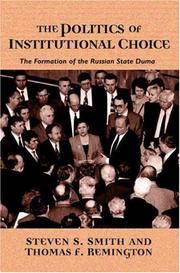
ISBN: 0691057362 0691057370 1400814715 1400823943 140081815X Year: 2001 Publisher: Princeton : Princeton University Press,
Abstract | Keywords | Export | Availability | Bookmark
 Loading...
Loading...Choose an application
- Reference Manager
- EndNote
- RefWorks (Direct export to RefWorks)
Events in Russia since the late 1980s have created a rare opportunity to watch the birth of democratic institutions close at hand. Here Steven Smith and Thomas Remington provide the first intensive, theoretically grounded examination of the early development of the State Duma, the lower house of the Russian Federation's parliament created by the 1993 constitution. They offer an integrated account of the choices made by the newly elected members of the Duma in establishing basic operating arrangements: an agenda-setting governing body, a standing committee system, an electoral law, and a party system. Not only do these decisions promise to have lasting consequences for the post-communist Russian regime, but they also enable the authors to test assumptions about politicians' goals from the standpoint of institutional theory. Smith and Remington challenge in particular the notion, derived from American contexts, that politicians pursue a single, overarching goal in the creation of institutions. They argue that politicians have multiple political goals--career, policy, and partisan--that drive their choices. Among Duma members, the authors detect many cross currents of interests, generated by the mixed electoral system, which combines both single-member districts and proportional representation, and by sharp policy divisions and an emerging party system. Elected officials may shift from concentrating on one goal to emphasizing another, but political contexts can help determine their behavior. This book brings a fresh perspective to numerous theories by incorporating first-hand accounts of major institutional choices and placing developments in their actual context.
Legislative bodies --- Representative government and representation --- Parlements --- Gouvernement représentatif --- Russia (Federation). --- Russia (Federation) --- Russie --- Politics and government --- Politique et gouvernement --- -Representative government and representation --- -#SBIB:328H262 --- #SBIB:35H6020 --- Parliamentary government --- Political representation --- Representation --- Self-government --- Constitutional history --- Constitutional law --- Political science --- Democracy --- Elections --- Republics --- Suffrage --- Bicameralism --- Legislatures --- Parliaments --- Unicameral legislatures --- Estates (Social orders) --- Legislative power --- Instellingen en beleid: Rusland en het GOS --- Bestuur en beleid: nationale en regionale studies: Oost-Europa --- Russia (Federation). Federal'noe Sobranie. Gosudarstvennai︠a︡ Duma --- -Politics and government --- -Legislative bodies --- Gouvernement représentatif --- #SBIB:328H262 --- Gosduma (Russia : 1993- ) --- Russian State Duma (Russia : 1993- ) --- Duma (Russia : 1993- ) --- Gosudarstvennai︠a︡ Duma Rossiĭskoĭ Federat︠s︡ii --- Gosduma FS RF
Book
ISBN: 0871875594 Year: 1990 Publisher: Washington : Brookings Institution,
Abstract | Keywords | Export | Availability | Bookmark
 Loading...
Loading...Choose an application
- Reference Manager
- EndNote
- RefWorks (Direct export to RefWorks)
342.536.4 <73> --- United States. Congress --- -United States. Congress --- -Committees --- Reform --- United States --- -Politics and government --- -342.536.4 <73> --- United States. --- Committees. --- Reform. --- Politics and government --- Droit constitutionnel
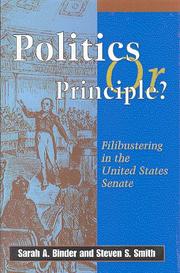
ISBN: 0815709528 Year: 1997 Publisher: Washington, D.C. Brookings Institution
Abstract | Keywords | Export | Availability | Bookmark
 Loading...
Loading...Choose an application
- Reference Manager
- EndNote
- RefWorks (Direct export to RefWorks)
Book
ISBN: 9780815702887 9780815702894 Year: 2009 Publisher: Washington, D.C. Brookings Institution Press
Abstract | Keywords | Export | Availability | Bookmark
 Loading...
Loading...Choose an application
- Reference Manager
- EndNote
- RefWorks (Direct export to RefWorks)
Political sociology --- Internal politics --- Government --- United States of America
Book
ISBN: 1483304507 1483329895 1483300951 Year: 1997 Publisher: Washington, D.C. : ©1997 CQ Press,
Abstract | Keywords | Export | Availability | Bookmark
 Loading...
Loading...Choose an application
- Reference Manager
- EndNote
- RefWorks (Direct export to RefWorks)
Committees in Congress provides a comprehensive examination of the current state of committees and committee systems in both houses of the U.S. Congress. This third edition examines the reforms adopted under the Republican-controlled Congress, especially in the context of the "Contract With America" and the interparty warfare on Capitol Hill. It also offers complete coverage of the new rules and structural changes to the House and Senate committee systems, including chamber- and party-rules changes, reduced staffing, the elimination of some committees and subcommittees, and new procedures for the selection of committee leaders.
United States. --- Committees. --- Reform. --- United States --- Politics and government
Book
ISBN: 9781400823949 Year: 2000 Publisher: Princeton, NJ
Abstract | Keywords | Export | Availability | Bookmark
 Loading...
Loading...Choose an application
- Reference Manager
- EndNote
- RefWorks (Direct export to RefWorks)
| Listing 1 - 10 of 17 | << page >> |
Sort by
|

 Search
Search Feedback
Feedback About UniCat
About UniCat  Help
Help News
News